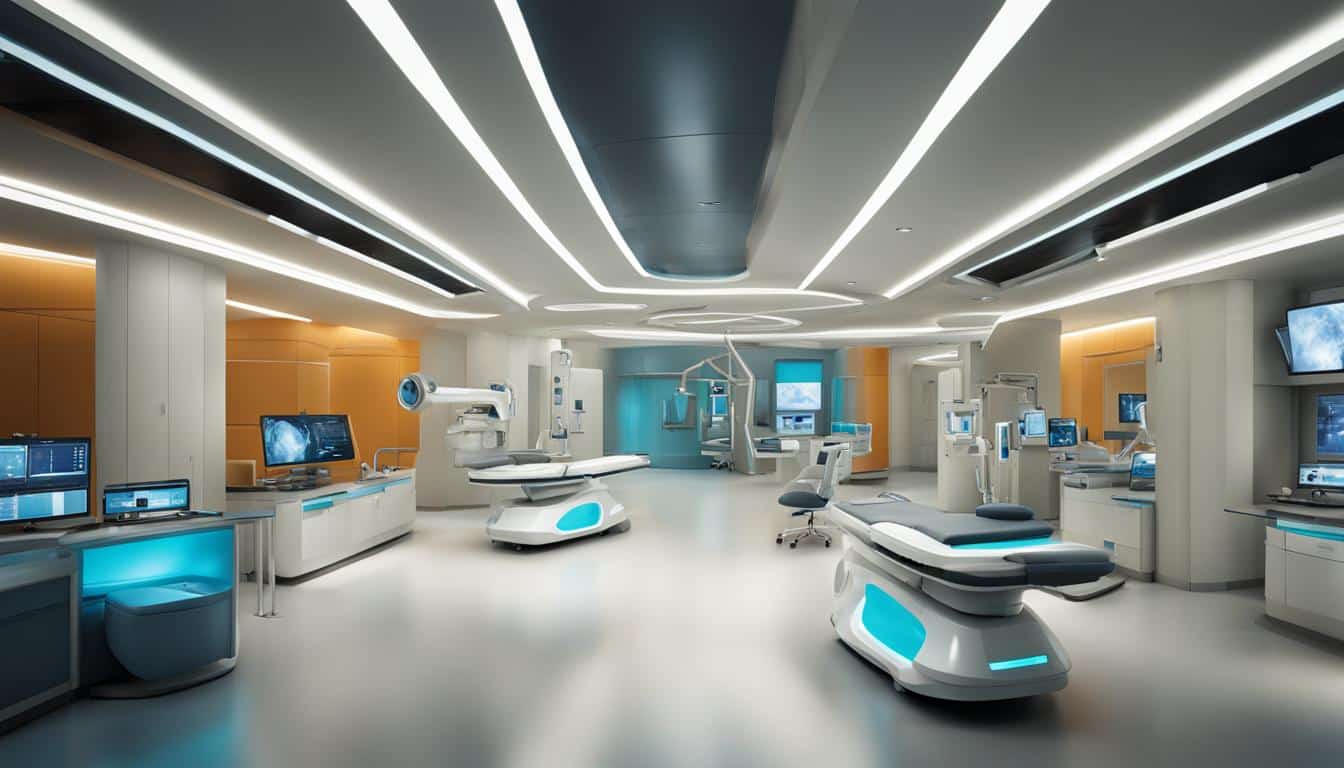
The healthcare industry is increasingly recognizing the importance of user experience (UX) design in improving patient care and overall satisfaction. Healthcare UX focuses on creating intuitive and seamless digital experiences for both healthcare professionals and patients. It encompasses accessibility, usability, visual design, content strategy, privacy, and security. Good healthcare UX can lead to more satisfied patients who actively engage in managing their own health. It also streamlines processes and improves healthcare outcomes. The key components of impactful healthcare UX include effective communication using clear and simple language, personalized interfaces and treatment plans, information security to protect patient privacy, and making healthcare more accessible through mobile-friendly designs, assistive technology, language accessibility, telehealth, and leveraging social media platforms.
Key Takeaways:
- Healthcare UX is crucial for improving patient care and satisfaction.
- Effective communication and personalized interfaces are key components of impactful healthcare UX.
- Information security and accessibility are important considerations for healthcare website design.
- Mobile-friendly designs, telehealth, and social media platforms can enhance healthcare accessibility.
The Role of AI in Transforming Healthcare
Artificial intelligence (AI) is revolutionizing the healthcare industry by providing powerful tools and applications that enhance patient care and streamline processes. One notable application of AI is ChatGPT, an AI-powered natural language processing model that is being used to develop virtual assistants for telemedicine. These virtual assistants offer guidance and support to patients remotely, improving access to healthcare services and ensuring round-the-clock care.
AI is also playing a crucial role in clinical decision support. By analyzing vast amounts of data, AI algorithms can provide evidence-based recommendations to healthcare providers, helping them make informed decisions regarding patient care. This not only saves time but also improves treatment outcomes.
In addition to clinical decision support, AI has transformed medical recordkeeping. With AI technologies, healthcare professionals can generate automated summaries and extract relevant information from patient records, improving efficiency and accuracy. AI-powered medical translation services are also improving communication between patients and healthcare providers, breaking down language barriers and ensuring effective care.
The Impact of AI in Different Areas of Healthcare
AI has made significant contributions in various areas of healthcare:
- Medication Management: AI algorithms can analyze patient data to identify potential drug interactions and optimize medication plans.
- Disease Surveillance: AI can analyze large datasets and identify patterns to detect outbreaks and monitor the spread of diseases.
- Symptom Checkers and Patient Triage: AI-powered symptom checkers help patients assess their symptoms and determine the urgency of medical attention.
- Medical Education: AI-powered platforms provide access to a wealth of educational resources, enabling healthcare professionals to stay updated with the latest medical knowledge and advancements.
- Mental Health Support: AI chatbots and virtual assistants can provide personalized mental health support, assisting individuals in managing their mental well-being.
- Remote Patient Monitoring: AI-powered devices and algorithms enable the remote monitoring of patients, allowing healthcare providers to track vital signs and provide timely interventions.
With AI continuing to advance and evolve, the healthcare industry can expect further transformation in the future. From personalized medicine to virtual and augmented reality in healthcare, AI will play a critical role in improving patient care and outcomes.

| AI Applications in Healthcare | Benefits |
|---|---|
| Clinical Decision Support | Improves treatment outcomes by providing evidence-based recommendations. |
| Medical Recordkeeping | Enhances efficiency and accuracy by automating record summarization and extraction of relevant information. |
| Medical Translation | Improves communication and breaks language barriers between patients and healthcare providers. |
| Medication Management | Identifies potential drug interactions and optimizes medication plans. |
| Disease Surveillance | Detects outbreaks and monitors the spread of diseases by analyzing large datasets. |
| Symptom Checkers and Patient Triage | Assists patients in assessing symptoms and determining the urgency of medical attention. |
| Medical Education | Provides access to educational resources for healthcare professionals to stay updated with medical advancements. |
| Mental Health Support | Offers personalized mental health support through AI chatbots and virtual assistants. |
| Remote Patient Monitoring | Enables healthcare providers to remotely monitor patients' vital signs and provide timely interventions. |
Future Trends in Healthcare Design and Technology
As technology continues to advance, the future of healthcare design and technology holds immense potential for transforming patient care. One such trend is the use of generative AI in healthcare, which will bring about a new era of personalized recommendations and the creation of synthetic data. This powerful technology will not only democratize access to AI applications but also revolutionize treatment plans tailored to individual patients. The integration of generative AI into healthcare systems will pave the way for more precise and targeted interventions.
Virtual healthcare assistants and chatbots are another exciting trend that will shape the future of healthcare. These intelligent virtual agents will assist both clinicians and patients, providing valuable advice, answering questions, and connecting individuals with the necessary information. With their ability to understand natural language and offer personalized support, virtual healthcare assistants have the potential to improve patient engagement and access to healthcare services.
Digital twins, a concept borrowed from the industrial sector, will also find their place in healthcare design and technology. These virtual replicas of real-world systems will be employed to simulate and optimize healthcare services, leading to improved efficiency and better patient outcomes. By leveraging digital twins, healthcare providers can gain valuable insights into the functioning of healthcare systems, enabling them to make data-driven decisions and enhance the overall delivery of care.
Advancements in technology will also give rise to IoT-powered virtual hospitals and the expansion of telemedicine. These innovations will enable remote patient monitoring and care delivery, empowering patients to receive high-quality healthcare from the comfort of their homes. Additionally, the convergence of virtual and augmented reality in healthcare will open up new avenues for pain management, surgical support, wound care, and patient education. These immersive technologies have the potential to enhance patient experience and improve treatment outcomes.
The Future is Here
The future of healthcare design and technology encompasses various other trends, including preventative healthcare, elderly care, 3D printing, and the convergence of mental and physical healthcare delivery. Preventative healthcare will prioritize proactive approaches and early intervention to prevent the onset of diseases. Innovations in elderly care will focus on enabling older adults to age in place while developing targeted treatment options for age-related conditions. Meanwhile, 3D printing will revolutionize healthcare by allowing for on-demand production of medical devices and potentially even organs for transplantation. Lastly, the convergence of mental and physical healthcare will pave the way for a holistic approach to patient care, recognizing the vital connection between mental and physical well-being.
The future of healthcare design and technology is bright, promising improved patient care, enhanced outcomes, and transformative experiences for both patients and healthcare professionals. As technology continues to evolve, it is crucial for healthcare providers to embrace these trends and leverage them to their fullest potential, ensuring that they stay at the forefront of innovation and deliver the best possible care to their patients.
FAQ
How does healthcare UX improve patient care and satisfaction?
Healthcare UX focuses on creating intuitive and seamless digital experiences for healthcare professionals and patients. It improves patient care and satisfaction by streamlining processes, improving healthcare outcomes, and allowing patients to actively engage in managing their own health.
What are the key components of impactful healthcare UX?
The key components of impactful healthcare UX include effective communication using clear and simple language, personalized interfaces and treatment plans, information security to protect patient privacy, and making healthcare more accessible through mobile-friendly designs, assistive technology, language accessibility, telehealth, and leveraging social media platforms.
How is artificial intelligence (AI) revolutionizing the healthcare industry?
AI is revolutionizing healthcare by providing powerful tools and applications. It is being used for developing virtual assistants for telemedicine, clinical decision support, medical recordkeeping, medical translation services, medication management, disease surveillance, clinical trial recruitment, symptom checkers, patient triage, drug information, medical education, mental health support, and remote patient monitoring.
What are the expected advancements in healthcare design and technology?
Expected advancements in healthcare design and technology include generative AI, personalized medicine, virtual healthcare assistants and chatbots, digital twins, IoT-powered virtual hospitals, telemedicine 2.0, preventative healthcare, virtual and augmented reality, care for the elderly, 3D printing in healthcare, and the convergence of mental and physical healthcare delivery.











